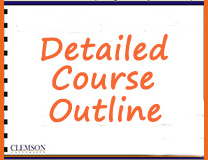First Summer Session 2016
Course: CE 4560/5460 Pavement Design and Construction
Course Description: Introduction to design methods, construction practices, maintenance strategies, and decision making process related to pavements. Other topics, such as environmental considerations and special pavement types and materials, are also covered. Preq: CE 3110 and CE 3510. Preq or concurrent enrollment: CE 3210
Course Material Presentation:
Detailed course outline

Topics Covered:
At the completion of this course students should be able to apply the tools learned in this course to specific pavement design methods, construction practices, preservation strategies, and decision making processes. The specific objectives of this course include:
- Learn pavement design methods and considerations for paved (rigid and flexible) roads.
- Learn how roadways are constructed, including earthwork, base construction, and paving.
- Learn about pavement management systems and applications, including field pavement evaluations.
- Learn different pavement preservation strategies and applications.
- Learn about life cycle and economic considerations relating to pavements.
Assessment:
- Assignments submitted online – scanner required
- Quizzes/tests – Student responsible for obtaining proctor
- Final Exam – Student responsible for obtaining proctor
- No on-campus presence required
Instructor:
Brad Putman
putman@clemson.edu
864-656-0374
Student Outcomes – (ABET) - This course contributes to the following ABET Civil Engineering Program Objectives to demonstrate:
- an ability to apply knowledge of engineering including four technical areas appropriate to civil engineering.
- an ability to design a system, component, or process in more than one civil engineering context to meet desired needs within realistic constraints such as economic, environmental, social, political, ethical, health and safety, manufacturability and sustainability.
- an ability to identify, formulate, and solve engineering problems.
- an understanding of professional and ethical responsibility.
- an ability to communicate effectively.
- a broad education necessary to understand the impact of engineering solutions in a global, economic, environmental, and societal context.
- an ability to use the techniques, skills, and modern engineering tools necessary for engineering practice.
Not a Clemson Student?
Undergraduate Students from other institutions who wish to enroll in courses during the summer only are considered transient students. Visit our "Registrar's page for specific information regarding registration for summer classes.

